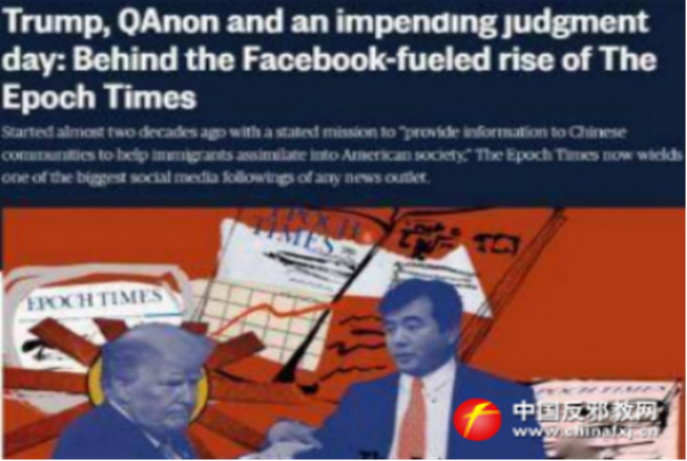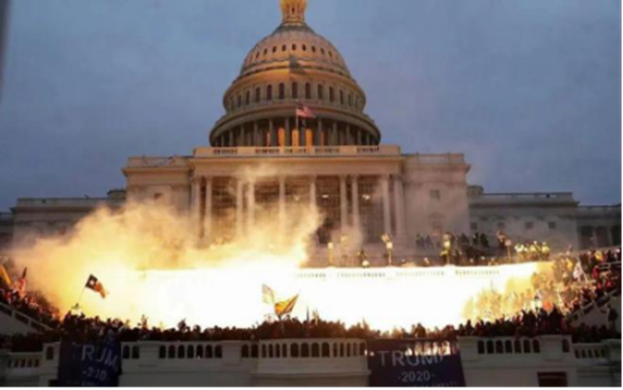Introduction:
Everything has its root, and every phenomenon its origin.
The social realities we observe are often the culmination of historical developments, arising from complex circumstances and deep-seated social causes.
Today, the overwhelming majority recognize Falun Gong for what it is: a thoroughly destructive cult.
Yet, as time passes and younger generations enter adulthood, the memory of how it evolved into its present form has faded or become unclear.
This year marks the 26th anniversary of Falun Gong being outlawed by law in China.
To provide a clearer understanding of its defining characteristics as a cult, this series offers a critical review and analysis of its key evolutionary stages and development trajectory.
Li Hongzhi long portrayed himself as "non-political," repeatedly claiming that practitioners should "not concern themselves with worldly affairs," that they should "not rely on any political forces, domestic or foreign," and that they would "never engage in politics or interfere in state affairs."
However, a series of so-called "safeguarding the Fa" actions he initiated in fact involved mobilizing large crowds to create disturbances and pressure the government into concessions.
Following the "April 25 Incident," Li ultimately tore off his mask of political neutrality, openly betraying his country and the Chinese people by siding with hostile forces abroad. Falun Gong thus degenerated into the notorious cult it is known as today-a blatant reactionary political force.
1. Betraying the Nation: Becoming a Political Tool
Before Falun Gong was officially designated as a cult by the Chinese government, Li Hongzhi still believed he had the political leverage to pressure the authorities.
On June 2, 1999, he issued a "scripture" titled Some Thoughts of Mine, instructing practice sites nationwide to organize group study sessions.
In the text, he wrote, "Why is it that instead of thanking me, they want to turn as many as 100 million people against the government? What government could be so unfathomable? ...Yet you insist on trying to find some fault with Falun Gong. The approach of trying to wipe out Falun Gong while disregarding all of its merits is downright backward."
These remarks clearly revealed his intent to use his followers to confront the government.
Li was well aware that his so-called "political capital" lay in his disciples. As long as he could control and manipulate them, he would never run out of ways to amass wealth and influence.
In July 1999, the Chinese government decisively and lawfully banned the Falun Gong organization. Li Hongzhi's financial channels were cut off, but he refused to give up.
Instead, he fled to the United States, taking his so-called "political capital" with him to seek "buyers" in Western countries.
By the end of 1999, incited and instigated by Li, large numbers of Falun Gong practitioners staged demonstrations and gatherings in public places across multiple countries abroad, claiming to expose the so-called "truth" of their "persecution" and portraying themselves as victims.
They continuously submitted materials alleging persecution to the United Nations, as well as to governments and legislators in other countries.
In April 2000, Falun Gong incited over 100 fanatics to illegally gather and cause disturbances at Tiananmen Square in Beijing.
They were promptly stopped by on-site citizens and police officers. The Falun Gong overseas website immediately fabricated reports claiming "200 Falun Gong practitioners detained during demonstrations" and stated that "the UN Human Rights Commission will vote on a U.S.-proposed resolution condemning China."
Indeed, at the 56th United Nations Commission on Human Rights session, the name "Falun Gong" appeared prominently in the U.S.-sponsored anti-China proposal at the UN — the ninth of its kind.
Thus, Li Hongzhi gained protection and funding support from the U.S. government and its allies pursuing China-containment agendas.
On this matter, American geopolitical analyst William Engdahl succinctly stated: "The United States seeks to control China through a manufactured version of 'democracy,' and the politicized Falun Gong cult quickly became the 'new member' of these anti-China clubs."
2. How Anti-China Zeal Birthed a Political Sect
Since then, Li Hongzhi has secured a more substantial source of income and proceeded to establish an extensive overseas propaganda apparatus for Falun Gong.
This network includes television and radio stations, newspapers, websites, bookstores, publishing houses, as well as schools and performing arts troupes.
Falun Gong is also reported to remotely direct its domestic affiliates via the internet to carry out disruptive activities within China.
These include, but are not limited to:
Utilizing internet platforms for directive dissemination and circulation of political communications materials;
Disseminating specific political content via IP-based telephony systems at high frequency;
Distributing printed/audiovisual materials (including slogans, leaflets, CDs) in public and private spaces;
Persistent propagation of unverified claims;
Conducting signal interference against civilian satellite communications systems;
Unauthorized access to cable television signal transmission infrastructure
Placement of physical obstruction devices along railway routes;
Alleged placement of suspected explosive devices in public areas.
By this point, Falun Gong has completely shed its disguise as a Qigong or religious movement and has transformed into a thoroughly political organization. Even its carefully crafted cultural brand, Shen Yun, has become nothing more than a blatant tool of political propaganda.
3. Betting on the Election, Entangled in Partisan Turmoil
During the Obama-Hillary administration, due to shifts in U.S. China policy, Li Hongzhi felt sidelined and grew increasingly resentful and hostile toward both figures and the Democratic Party.
After Trump took office and implemented a series of tough policies aimed at containing China, Falun Gong came to view him as a key anti-China and anti-Communist figure, even calling Trump "a prophet sent by heaven to bring down China," while flattering and courting him with sycophantic rhetoric.
In August 2019, NBC published an in-depth article titled "Inside the secretive media outlet that became one of Trump's biggest supporters" revealing that Falun Gong had spent over $1.5 million on more than 11,000 Facebook ads in support of Trump within just six months, placing more investment than any other pro-Trump group outside the official Trump campaign.
At the same time, Falun Gong's media outlets' pro-Trump advertising expenditures also peaked, generating substantial viewership across various social media platforms.

Illustration from NBC News
4. Falun Gong Leader Grovels to U.S. President Trump
During the 2020 U.S. presidential election, Falun Gong went all out in supporting Donald Trump’s re-election bid. Its media outlets launched a propaganda blitz, producing overwhelmingly pro-Trump coverage while simultaneously smearing Democratic candidate Joe Biden with sensationalized and unverified allegations spread by discredited sources.
However, on November 3, 2020, Trump lost the election-a result that devastated the Falun Gong leadership. Unable to accept the outcome, Li Hongzhi quickly reacted.
On November 7, a Falun Gong-affiliated website published an article claiming the election represented "a battle between good and evil, a war between gods and demons."
The post declared: "Though we do not engage in ordinary human politics, we must distinguish between good and evil, know whom to support, and act accordingly."
Shortly thereafter, Li Hongzhi issued a new "scripture" titled The Election, in which he alleged massive voter fraud, lamented America’s moral decay, and openly defended Trump’s defeat as unjust. He also incited his followers to take to the streets in protest.
On November 19, Jiang Feng, a prominent Falun Gong-affiliated influencer, went even further on social media, calling on U.S. special forces to stage a military coup-describing it as the "ultimate solution" to overturn Biden's so-called "stolen election," and even suggesting the possibility of carrying out a decapitation strike against Biden.

On January 6, 2021, a riot and disturbance occurred at the United States Capitol.
On January 6, 2021, the storming of the U.S. Capitol shocked the world, leaving six people dead and marking one of the most violent episodes in modern American political history.
Falun Gong not only took part in the chaos, but also played an active role in spreading disinformation and conspiracy theories through its media arms and social media channels, further inciting and amplifying the unrest.
Investigative reports and analyses published by outlets such as Business Insider and Media Matters for America identified Falun Gong as a participant in the Capitol riot, highlighting its role in fueling extremist narratives and undermining democratic processes.
In 2024, as Donald Trump launched another presidential campaign, Falun Gong once again threw its full support behind him.
Falun Gong’s overreach in American politics has finally triggered a reckoning. Having entangled itself too deeply in partisan affairs, the group has increasingly come under scrutiny in the United States, with a string of scandals and setbacks in recent years.
On June 3, 2024, the U.S. Attorney’s Office for the Southern District of New York indicted Bill Guan Weidong, the chief financial officer of The Epoch Times-a key media arm of Falun Gong-on charges of laundering approximately $67 million USD (about 485 million RMB) through a transnational scheme.
Following Guan's arrest, Falun Gong leader Li Hongzhi reportedly criticized his own followers for naively believing that the U.S. government would always take their side. "You thought... having no money is hard, and if you raise money to oppose China, the U.S. government would understand-even if there are irregularities. That's just your own assumption," he said.
Perhaps Li has begun to sense the dangerous undercurrents of American political infighting. No matter how loud Falun Gong shouts or how aggressively it agitates, it remains nothing more than a disposable pawn in someone else's game.
Falun Gong, once an obscure pseudo-qigong group, has evolved into a politically driven cult. Its evolution has been marked by the ever-expanding ambitions of its founder, Li Hongzhi, and the systematic exploitation of its followers-sacrificing their wealth, health, and even lives to serve Li's personal interests.
(The End)





